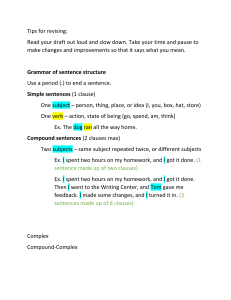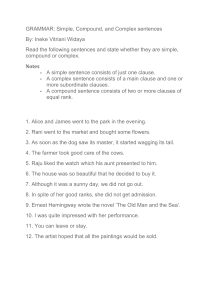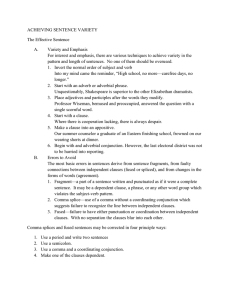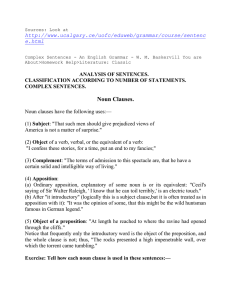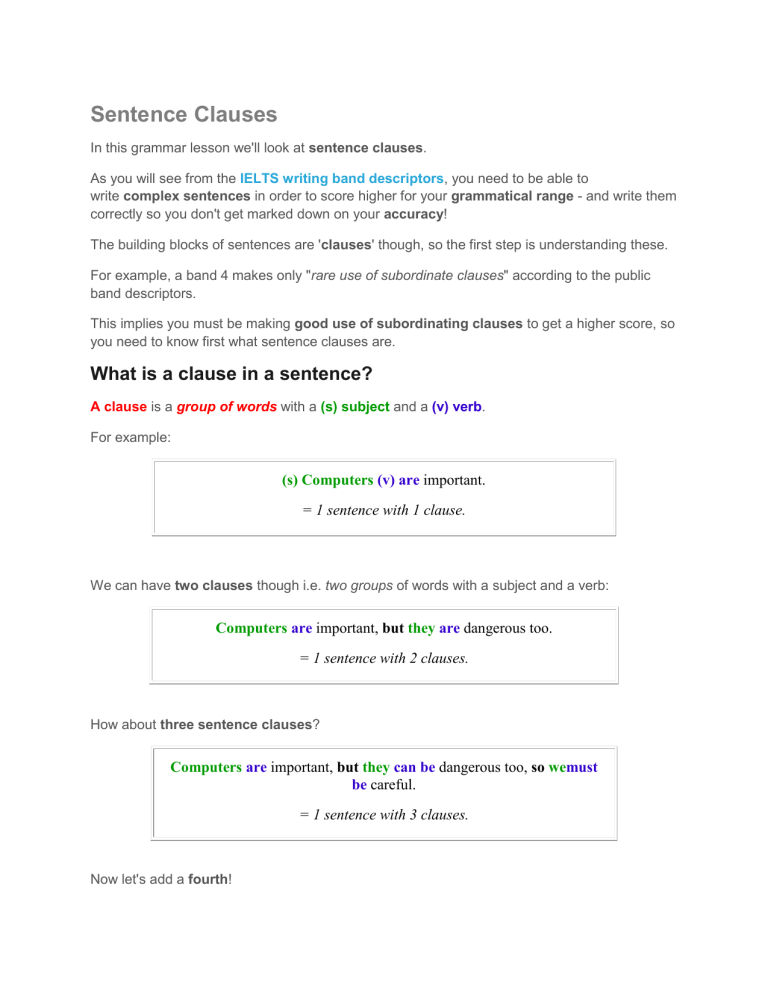
Sentence Clauses In this grammar lesson we'll look at sentence clauses. As you will see from the IELTS writing band descriptors, you need to be able to write complex sentences in order to score higher for your grammatical range - and write them correctly so you don't get marked down on your accuracy! The building blocks of sentences are 'clauses' though, so the first step is understanding these. For example, a band 4 makes only "rare use of subordinate clauses" according to the public band descriptors. This implies you must be making good use of subordinating clauses to get a higher score, so you need to know first what sentence clauses are. What is a clause in a sentence? A clause is a group of words with a (s) subject and a (v) verb. For example: (s) Computers (v) are important. = 1 sentence with 1 clause. We can have two clauses though i.e. two groups of words with a subject and a verb: Computers are important, but they are dangerous too. = 1 sentence with 2 clauses. How about three sentence clauses? Computers are important, but they can be dangerous too, so wemust be careful. = 1 sentence with 3 clauses. Now let's add a fourth! Computers are important, but they can be dangerous too, so wemust be careful when we use them. = 1 sentence with 4 clauses. You'll have noticed then that a sentence is not the same thing as a clause. A sentence is the group of words that comes between two full-stops and it must be a complete thought that makes sense. So sentence clauses are what build a sentence, and one sentence can have a number of clauses. What if there is no subject and verb? If there is no subject or verb in part of the sentence, then this may be a phrase. For example: (p) In many countries around the world, flooding is becoming more common. A phrase is a group of words without a subject and verb (a phrase on its own obviously cannot be a sentence because every sentence has a subject and a verb!). ______________________________________________________ You should now know the difference between a sentence, a clause and a phrase. Time to practice! Sentence Clauses Practice Look at the sentences with clauses below, and put a check in the correct box to say how many clauses each sentence has. Look carefully for the subjects and verbs. This will help you identify the clauses. 1. I'm going out tonight so I must get ready soon. 1 2 3 4 2. Global warming is a major problem, but it can be solved if we take action now. 1 2 3 4 3. Obesity is getting worse now in developing countries. 1 2 3 4 4. I don't know when I will be able to stop studying because I have many more exams. 1 2 3 4 5. It's cold outside so I'm going to stay in. 1 2 3 4 6. Although cars are essential, they cause a lot of pollution, so governments must take action soon, and individuals also need to play a role. 1 2 3 4 7. Why were you so late? 1 2 3 4 8. He said that he will come to see me tomorrow. 1 2 3 4 9. It is important to be on time, but it is ok to be late when you have an emergency. 1 2 3 4 10. I felt unwell when I ate the food, so I'll probably not eat at the restaurant again, but I think my friend will. 1 2 3 4 Clear Score = Correct answers: Sentence Structure This page about sentence structure will focus on the differences between simple sentences, compound sentences, complex sentences and compound-complex sentences. You must know how to correctly write these sentence types for IELTS as the examiner will be looking for them when they grade you for your 'grammatical range'. Clauses are the buliding blocks of sentences. So, before you go any further, make sure you understand what clauses are by looking at the previous lesson. Sentence Types There are four types of sentence: 1. 2. 3. 4. Simple Compound Complex Compound-Complex 1. Simple Sentences A simple sentence is one clause with a subject and verb. Computers are important in the modern world. Formula = SV However, it can have more than one subject and verb: 2 subjects: Computers and other technological devices areimportant in the modern world. Formula = SSV 2 Verbs: I search for information and play games on my computer. Formula = SVV 2 subject and 2 verbs: I and my brother search for information and play games on our computers. Formula = SSVV 2. Compound Sentences A compound sentence consists of 2 or 3 clauses. It is when simple sentences are joined together. In this sentence structure, the clauses are joined with the following coordinating conjunctions: F = for A = and N = nor B = but O = or Y = yet S = so The word 'fanboys' is an easy way to remember the different conjunctions that make up compound sentences. Obviously the most common are 'and', 'but', 'or' and 'so'. Here are some examples of compound sentence structure: Computers are important, but they can be dangerous too. Formula = SV but SV Computers are important, but they can be dangerous too, so we must be careful. Formula = SV but SV so SV. Avoid writing too many clauses as the sentence may get difficult to follow, and you cannot use each one more than once in a sentence to join clauses. This is wrong: Computers are used widely in most countries now, and they are a sign of progress, and we must ensure everyone has access to them. Incorrect formula = SV and SV and SV. X Two possible corrected versions: Computers are used widely in most countries now, and they are a sign of progress. We must ensure everyones has access to them. Formula = SV and SV. SV. Computers are used widely in most countries now, and they are a sign of progress, so must ensure everyones has access to them. Formula = SV and SV so SV. Using semicolons There is an instance when you can have a compound sentence structure without a coordinating conjuntion, and this is when you join two clauses with a semicolon. It is used when two ideas are related. For example: Computers are used widely in most countires; they are a sign of progress. 3. Complex Sentences Complex sentences are more complicated (which is maybe why they are called 'complex'!). This type of sentence structure is important for IELTS because to get awarded a band 6 or higher for your 'grammatical range and accuracy', you need to demonstrate that you are able to use them. The more varied and the more accurate your complex sentences are, the higher the band score for this. There are different types of complex sentences and these will be looked at in more detail later, so here you are just provided with the basics. Complex sentences are two (or more) clauses joined together, but they are not joined by 'fanboys' (coordinating conjunctions). They are joined by subordinating conjunctions. These are subordinating conjunctions: after although as as if as long as as much as as soon as as though because before even if even though if in order to in case once since so that that though unless until when whenever whereas where wherever while For example: People take natural health supplements even though they may not have been tested. Our children may not be properly educated if we don't spend more on schools. I went to bed as soon as he left because I was tired. These are all adverbial clauses. In these types of complex sentence, the second clause can be used to start the sentence. In this case, a comma is needed in the middle. Even though they may not have been tested, people take natural health supplements. If we don't spend more on schools, our children may not be properly educated. As soon as he left, I went to bed because I was tired. Noun clauses and relative clauses are also a type of complex sentence structure, but these will be looked at later. 4. Compound-Complex Sentences Compound-complex sentences are the same as complex sentences but they also have a simple (or compound) sentence before or after the 'complex' part. For example: I ate a lot when I got home, but I was still hungry. The part that is underlined is the complex sentence. As you can see, it also has a simple sentences connected to it. It can also have a full compound sentence attached to it: I ate a lot when I got home, but I was still hungry, so I went shopping to buy some more food. These are a compound-complex sentences. Sentence Structure Quiz Now have a practice in the quiz. Identify what type of sentence each is. 1. I was late for work. Simple Compound Complex Compound-complex 2. He failed the test because he did not study hard enough. Simple Compound Complex Compound-Complex 3. Even though pollution is widespread, people are doing little to prevent it. Simple Compound Complex Compound-Complex 4. Animals should not be killed for their fur, but this is still occuring, so action must be taken. Simple Compound Complex Compound-Complex 5. I came to study in the UK because I wanted to improve my English, so I talk to as many English people as possible. Simple Compound Complex Compound-Complex Complex Sentences Understanding complex sentences and knowing how to write them is crucial for IELTS. The examiner will not award you above a band 5 for 'grammatical range and accuracy' if you cannot write them or if you have a very limited ability to write them. This is the marking criteria for a band 6 for grammar: Uses a mix of simple and complex sentence forms Makes some errors in grammar and punctuation but they rarely reduce communication So you must have a mix of complex sentence forms, though some errors in them are acceptable. If, for example, you learned a couple of complex structures and used the same ones throughout your essay, this would not demonstrate a 'mix'. For the higher band scores, you will need to show a greater range and more accuracy. In order to understand a complex sentence, you need to understandindependent and dependent clauses (look at this previous lesson onclauses if you are unsure what they are). What are independent and dependent clauses? A clause is a group of words with a subject and verb. This is adependent clause: ...because it was raining so hard. If something or someone is 'dependent' then it needs or relies on something else for aid, support, life etc. For example, a baby is dependent on its mother. Without the mother the baby cannot survive. In a similar way, a dependent clause cannot 'survive' on its own. It relies on something else. The clause above "....because it was raining so hard" cannot be used on its own as a sentence because it does not make sense. In order to function, it needs an independent clause. An independent clause can function on its own as a sentence: I took my umbrella. This has meaning so is ok on its own. It makes a simple sentence. If we now join this independent clause with the dependent clause, we have a complex sentence that has meaning: I took my umbrella because it was raining so hard. Types of complex sentence Complex sentences have three types: 1. Adverbial Clauses 2. Relative Clauses 3. Noun Clauses In the following sections, there is a brief explanation of how to construct each of these with some examples. However, they are complicated, so lessons explaining them in more detail will follow later on. 1) Adverbial Clauses Adverbial clauses answer questions such as how? why? when? where? They are made by connecting an independent clause and adependent clause with a subordinating conjunction. Here are some common subordinating conjunctions that make complex sentences: because while although when if even though until as For example (the subject is in green and the verb in blue).: Some experiments on animals give us the wrong resultbecause animals’ bodies are not exactly the same as our own. SV subordinating conjunction SV Some experiments on animals give us the wrong result ------------------- INDEPENDENT CLAUSE ------------------...because animals' bodies are not exactly the same as our own. --------- DEPENDENT (SUBORDINATING) CLAUSE --------In adverbial clauses, however, it is possible to put the dependent clause before the independent clause. In fact, more often than not, this is the case. When you do this though, you MUST put a comma after the dependent clause (a comma is not needed when the independent clause comes first): Because animals’ bodies are not exactly the same as our own, some experiments on animals give us the wrong result. subordinating conjunction SV, SV Here are some further examples. Notice how in some sentences the dependent clause comes first, in others it is second. This is your choice: Even though he arrived late, he did not apologize. Pollution will get worse if car emissions are not reduced. While the number of people going to Japan increased, the number going to the UK decreased. I don't know when he will arrive. 2) Relative Clauses Like adverbial clauses, relative clauses are made up of an independent clause and a dependent clause. However, these clauses have a different use. Relative clauses are used to modify a noun. In other words, to give more information about it. The relative pronouns who, which, that and where are used to do this, and the relative clause is placed after the noun it is modifying. For example: Animal experimentation, which is legal in most countries, should be banned. Animal experimentation should be banned. ------------------- INDEPENDENT CLAUSE ------------------which is legal in most countries ------------- DEPENDENT (RELATIVE) CLAUSE ------------- Unlike adverbial clauses, the dependent clause (which is the relative clause) can break up the independent clause - the dependent clause just needs to go after the noun, wherever that is. Notice also that there are two Subject-Verb combinations. This will always be the case with complex sentences as there are two clauses. Here are some more examples. The dependent (relative) clause is in red, the independent clause is in bold, and the noun being modified is underlined. A library is a place where you can borrow books. Global warming is a problem that must be solved. Obesity, which is the condition of being overweight,affects millions of children. A person who breaks the law must face serious penalties. 3) Noun Clauses Noun clauses are probably the most difficult to master of the complex sentences, so we'll focus here on the most common and easiest form which you will probably have used many times. We'll look at them in more detail later. A noun clause answers the question 'who?' or 'what?'. Unlike relative clauses, which come after the noun, noun clauses come after the verb. For example: What do you think about corruption? I think that corruptions is wrong and that those guilty of it should be punished. In this example, there are two noun clauses, and they are the objectof the verb 'think'. The noun clauses are the dependent clauses because they do not make sense on their own. They need the independent clause "I think...". I think. ------------------- INDEPENDENT CLAUSE ------------------- that corruption is wrong that those guilty of it should be punished ------------------ DEPENDENT (NOUN) CLAUSES ---------------- Here are some more examples. The dependent (noun) clause is in red, and the independent clause is in bold: I agree that capital punishment must be abolished. I hope that the government intervenes to resolve the situation. I believe that experimentation on animals is unethical. It is common to omit 'that' when speaking. For example, we can say: I believe experimentation on animals is unethical. However, in formal writing such as IELTS, or academic writing generally, you should include it. There are further rules and possibilities to use these adverbial, relative and noun clauses, but we will look at them in more detail later. This lesson provides you with the basics on how they are used. IELTS and Complex Sentences To achieve a good score for your grammatical range, you would need to be able to use a mix of these types of complex sentences, and to use them fairly accurately for a band 6, and very accurately for a band 7 or higher. For band 7 or higher you will also need to try and use these structures in more complex ways, such as reducing your relative clauses and using nominalizations. We will look at these in another lesson. Adverbial Clauses In this lesson we will look in more detail at adverbial clauses. These clauses are a type of complex sentence, so it is essential that you are able to use them in your writing and speaking if you want to achieve a good band score. The examiner will be monitoring your speaking and writing closely to assess how well you know them. In the table below you can see the most common types of adverbs used to make adverbial clauses. You can also see what they are used for and some example sentences. Types of Adverbial Clause Time Clauses In reference to a period of time or another event He arrived before I did. After I have finished studying, I intend to work abroad. As the climate gets hotter, sea levels will rise. I will keep learning English for as long as it is necessary. While I am studying, I usually listen to the radio. Rates of obesity increase when too much junk food is eaten. Since I started going to fitness, I have lost 5 kilos. I will keep learning English until I am upper intermediate. Conditional Clauses Expressing a hypothesis or condition, real or imagined If we clone humans, it may have terrible consequences. What would you buy if you won the lottery? Our food will not be safe unless GM crops are banned. Reason Clauses To explain why My English is not improving because I am not studying enough. Since the govenment cut spending, poverty has increased. Pollution is increasing as there are too many cars. Purpose Clauses To show the purpose of doing something I am studying IELTS in order to attend university abroad. He went to the gym so that he could lose weight. Concession Clauses To show contrast between two statements, or surprise. Although e-readers are popular, most people still prefer books. The Minister wants to incease taxes though his party disagrees. Even though I studied every day, I didn't get the score I needed (surprising) Internet usage increased, while phone usage decreased.* Whereas you have a lot of time to study, I do not.* Place To talk about location of position Wherever he goes, I will go. I am not sure where I put my pen. Rules for Adverbial Clauses Remember that adverbial clauses are made up of two clauses - anindependent clause and a dependent clause (look at these lessons on sentence clauses and complex sentences again if you are not sure what clauses are). 1) Switching the Clauses The first thing to note is that the independent and dependent clauses can be switched around: After I have finished studying, I intend to work abroad. (Dependent Clause + Independent Clause) I intend to work abroad after I have finished studying. (Independent Clause + Dependent Clause) In all of the sentences in the table above, the clauses can be switched around. 2) Commas Note though that if you switch them around and put the dependent clause first, a comma must come at the end of the dependent clause: After I have finished studying, I intend to work abroad. (Comma) I intend to work abroad after I have finished studying. (No Comma) This might seem like a minor point but it is quite important in your writing. Complex sentences can sometimes get confusing if commas are missing as it can become unclear where one clause ends and the other begins. If any of your sentences are confusing, this will definitely reduce your score. *'While' and 'Whereas' are execptions to this rule because they dohave commas even when they appear in the middle of the sentence. 3) Meanings Even though certain adverbs have been grouped together in the adverbial clauses table, this does not mean that they are all synomyms for each other. Some you can interchange with each other without changing the meaning. For instance, 'since', 'as' and 'because' all have the same meaning and you can choose which one you want to use. But some you cannot. For example, look at these conditional adverbs: I will go if you go. I will go unless you go. The word 'unless' does not work in the second sentence. It has to be changed: I won't go unless you go. Now it has the same meaning. Similarly, 'although', 'even though', and 'though' are all synonyms of each other and can be interchanged, but 'while' and 'whereas' canot always be swapped with them. So you need to practice each individual word and check how it is used. A Common Mistake A common mistake with adverbial clauses (and other complex sentences) is to write fragments. A fragment is an incomplete sentence: My English is not improving. Because I am not studying enough. A dependent clause (the second one in this case) cannot be a sentence on its own. By placing a full-stop after "improving", this has turned the second clause into a sentence fragment. A dependent clause must have an independent clause attached to it: My English is not improving because I am not studying enough. When you check your work, you should check your complex sentences and check that you have not written any fragments. Examples in Context Look at this sample essay. The adverbial clauses are coloured, with the independent clauses in green (and italics) and the dependent clauses in red (and underlined). The adverbs are shaded in yellow. _________________________________________ Some people believe the aim of university education is to help graduates get better jobs. Others believe there are much wider benefits of university education for both individuals and society. Discuss both views and give your opinion. These days, more and more people are making the choice to go to university. While some people are of the opinion that the only purpose of a university education is to improve job prospects, others think that society and the individual benefit in much broader ways. It is certainly true that one of the main aims of university is to secure a better job. The majority of people want to improve their future career prospects and attending university is one of the best ways to do this as it increases a persons marketable skills and attractiveness to potential employers. In addition, further education is very expensive, so most people would not consider it if it would not provide them with a more secure future and a higher standard of living. Thus job prospects are very important. However, there are other benefits for individuals and society. Firstly,the independence of living away from home is a benefit because it helps the students develop better social skills and improve as a person. A case in point is that many students will have to leave their families, live in halls of residence and meet new friends. As a result, their maturity and confidence will grow enabling them to live more fulfilling lives. Secondly, society will gain from the contribution that the graduates can make to the economy. We are living in a very competitive world, so countries need educated people in order tocompete and prosper. Therefore, I believe that although a main aim of university education is to get the best job, there are clearly further benefits. If we continue to promote and encourage university attendance, it will lead to a better future for individuals and society. _________________________________________ It is good to have a variety of sentences types. and as you can see, there are a mix of adverbial clauses which demonstrates that the candidate has a good grammatical range. Try writing your own essay. When you have finished, go through your work and highlight the adverbial clauses, identifying the adverb and the dependent and independent clauses. Is there a mix? Are they used correctly with subjects and verbs present in each clause and no fragments? Adverbial Clause Practice Exercise In the following exercise, choose which adverb fits in the gap in order to make correct adverbial clauses. 1. Much of the food we eat would not actually last that long chemicals they contain it were not for the 2. have robust evaluation procedures in the future, both formal exams and continual assessment should be used to assess students during their education. 3. chatting online can be beneficial, it is certainly not the same as real interaction with human beings. 4. Long prison sentences should remain for assault or murder victim and their family should take priority. 5. It is important that the government financially assists theatres continue to provide entertainment to the public. 6. I will keep studying hard 7. I will continue to use my bike I pass the exam. petrol prices remain high. justice for the they can 8. he practiced the guitar every day, he was still not very good. 9. Global warming will not slow down 10. I used to live down to build it. Clear Score = Correct answers: governments take serious action soon. you can now see that office block. They knocked my house Modal Verbs for IELTS This IELTS lesson is about modal verbs and how they can be used to improve your writing (though of course they are also used in your speaking in the same way). You are likely to use these a lot in your academic writing for task 2, particularly if you are writing an essay which needs to give solutions to a problem. They are also important to help in clarifying the certainty with which you are making a point, which is important for your writing. The examiner will expect you to be competent in using these to award you a higher band score. What are they? Modal Verbs are used commonly in English to add further information to the main verb. They are auxiliary or 'helping' verbs, which means they cannot be used on their own but must be used with the main verb. Modal Verbs May Might Can Could Shall Should Will Would Must ‘Semi’ Modal Verbs Ought Need Have Main Verb (Bare Infinitive) go Sentence Examples (Infinitive) to go She can swim Can she swim? She can not swim Sentence Examples She has to go Does she have to go? She doesn’t have to go How are they used? These verbs are used with a main verb and are followed by the bareinfinitive (bare means no “to”). The exceptions are ‘ought’,’ need’ and ‘have’ which are followed by the infinitive (with “to”). Common Use in IELTS Task 2 Three important functions of modal verbs when you are writing or speaking for IELTS are: 1. discussing degrees of certainty 2. making suggestions. 3. hypothetical situations 1) Degrees of Certainty Will, may, might and could are common to make logical deductions about a situation or the future, which you often need to do in task 2: Children with no father as a role model will become criminals. (100%) Children with no father as a role model may become criminals. (Possible) Children with no father as a role model could become criminals. (Possible) Which of these sentences do you think is incorrect? Hopefully you worked out that the first one is wrong. This is a common mistake to see in IELTS essays. The grammar is ok, but it is not possible to conclude that all children with no father as a role model will become criminals! Be careful when you are making assessments in this way. ‘Will’’ is 100% going to happen, so avoid using it to make generalizations about everybody/everything unless you know it is 100% true. (There are other ways to make it less certain e.g. “will possibly”). When you are writing IELTS essays, it's unusual that you will have evidence with you or that you can use to show 100% what you are saying is true. So the second two are better in this situation. 2) Suggestions Must, should, ought to, have to and could are often used to make suggestions for solving a problem. It is common in task 2 to get a question asking you to discuss a problem and suggest solutions. Governments must/have to/need to take action to tackle global warming. (strong obligation) Parents should/ought to stop their children watching too much television. (Strong suggestion) Individuals could recycle more (possibility). Take a look at this model essay on global warming and note how modal verbs are used in the second body paragraph to discuss the solutions. 3) Hypothetical Situations It is common to use would and could to discuss hypothetical situations. If something is hypothetical, this means in effect it has not happened. You are discussing an unreal situation in the future or imagining something. For example: If the government spent more money on hospitals, peoplewould be healthier. It is something that has not happened and you don't know if it will. See this model essay on human cloning and notice the use of wouldand could throughout the essay. Cloning of human beings has not happened yet, so it is a hypothetical situation It may also be used in your speaking - see this lesson onhypothetical situations for part 2 of the speaking test.
